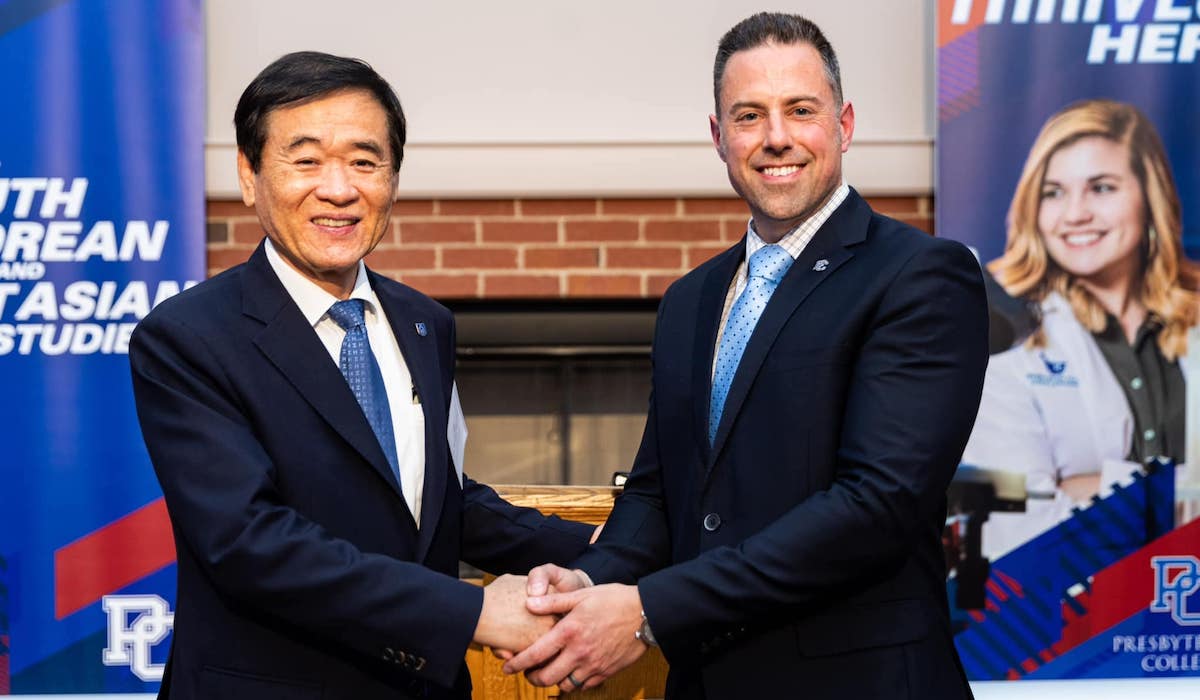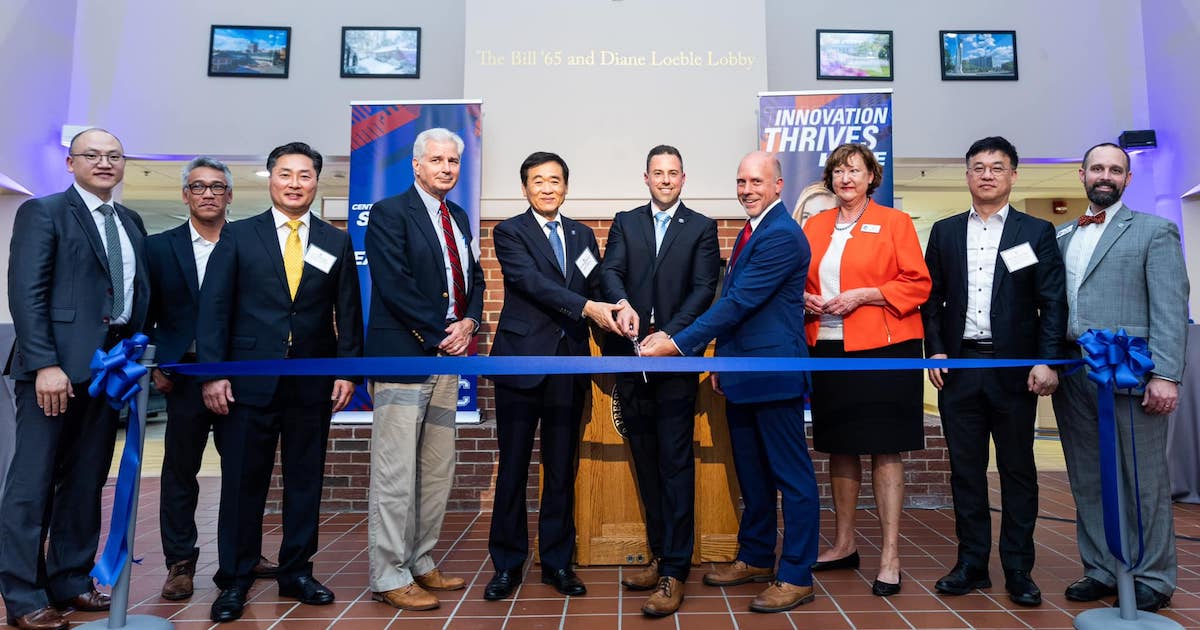Presbyterian College launches Center for South Korean and East Asian Studies

PC president Dr. Matthew vandenBerg (right) with Hannam University president Dr. Kwang-Sup Lee
Presbyterian College celebrated a vibrant new global initiative Thursday by launching its Center for South Korean and East Asian Studies.
Before an enthusiastic crowd of community members, faculty, staff, and college trustees, PC welcomed its new partners from South Korea to embark on an innovative language and cultural exchange program for students and professors on both sides of the globe.
At the ribbon-cutting ceremony in Carol International House, PC president Dr. Matthew vandenBerg said the center exemplifies the college’s status as America’s Innovative Service College and its standing as the flagship college for the Presbyterian Church.
“As our campus has discussed what it means to be America’s innovative service College, we realized that our work and, yes, our future would not be complete without a strategic commitment to East Asia and specifically to South Korea,” he said.
There are nine million Presbyterians in South Korea who share the college’s values and could be essential partners in the region, vandenBerg said. PC can also serve American and Korean business interests by connecting talented people and employers interested in international trade.
“We are an engine of economic growth in the making,” he said.
However, opportunities for PC students and faculty to study abroad and for overseas students to come to PC are central.
“Supporting exceptional students and faculty members is at the core of our enterprise,” vandenBerg said. “It’s the heart of our mission. And, so, partnering with East Asian countries and institutions opens the door to world class language and cultural exchange and research opportunities.”
Dr. Roy Campbell, professor of history and the director of the Center for South Korean and East Asian Studies, shared several exciting programs and partnerships already underway.
Last December, Campbell, vandenBerg, and PC’s chaplain and dean of spiritual life, the Rev. Dr. Buz Wilcoxon, visited South Korea, where they built several collaborative relationships with churches, secondary schools, and higher education institutions. This past March, Campbell led a group of faculty colleagues on a follow-up visit to explore professional collaboration, teaching, and research opportunities.
Biology professor Dr. Austin Shull presented his cancer research at Hannam University in Daejeon, while history professor Dr. Michael Nelson and psychology professor Dr. Stephanie Freis plan to spend part of their respective sabbaticals in South Korea this summer. English professor Dr. Emily Taylor will guide PC’s English proficiency program for visiting Korean and East Asian students.
Campbell will also return to South Korea this summer with eight PC students for a two-week study of Korean culture. Hannam, in turn, is sending 15 students to PC this summer for an intensive three-week English language program. The college will also actively recruit students from the region interested in studying full-time in the U.S. and offer domestic scholarships for students who want to discover Korean culture and language on campus and abroad.
PC and Hannam have also agreed to offer intensive online language programs for students from both schools.
Campbell applauded the vision, camaraderie, and collaborative spirit that fuels the new center.
“Friendship has been a key to the success and establishment of the center, whether that be the friendship between the United States and South Korea or the friendship we have with our distinguished guests from Hannam,” he said. “If there’s one primary objective for the center, it is really to build a thriving and welcoming community with our Korean and East Asian friends.
“If we continue on our current track, the Center for South Korean and East Asian Studies will have an enriching and absolutely transformative effect on this place that we all care so deeply about.”
Amongst those distinguished guests was the president of Hannam University, Dr. Kwang-Sup Lee.
Lee thanked the college for its historic relationship with Hannam, which was co-founded by PC alumnus and Presbyterian missionary Dr. John Somerville ’49, and its renewed spirit of collaboration.
“It is truly an honor and a privilege to take part in Hannam University’s first official visit to Presbyterian College,” Lee said. “We have long admired Presbyterian College as a leading academic institution and for its roots as a Christ-centered institution since its establishment in 1880.”
Lee praised both schools for sharing the Christian principles of truth, freedom, and service.
Sadly, Somerville, who passed away on May 10 at the age of 95, could not witness the new era of cooperation between his alma mater and the college he helped build. In addition to being one of Hannam’s founders in 1956, Somerville taught history there until he retired in 1994 and was instrumental in designing the campus along the same lines as PC.
Somerville’s son, John, was amongst the invited guests to the center’s launch. Other guests from South Korea included vice dean of global relations Dr. Kitai Kim; Wonbae Kim, director of the Center for International Relations; and Yongki Lee, coordinator of the Center for International Relations.
The college also welcomed Jeff Arnold, executive director of the Association of Presbyterian Colleges and Universities.
President vandenBerg also announced the dedication of the Bill ’65 and Diane Loeble Lobby in Carol International House, where students participating in the center’s activities will live on campus. The Loebles’ generous six-figure commitment was pivotal in establishing the center at PC.

